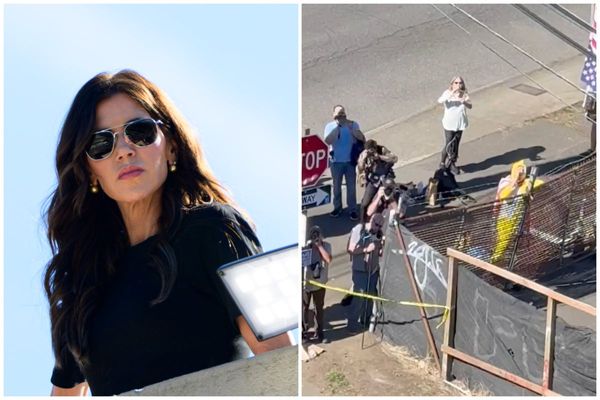
One of New South Wales’ most senior police officers has told a court that a proposed pro-Palestine march to the Sydney Opera House has “disaster written all over it” due to “significant” safety concerns.
Representatives from the Palestine Action Group and Jews Against Occupation are in the NSW court of appeal fighting the police over the proposed march from Hyde Park to the Sydney landmark this Sunday.
Last week, the group announced its plan to diverge from the normal route of its nearly weekly rallies over the past two years to mark two years since the October 7 attacks and call for “an end to genocide in Gaza”. But on Friday the NSW police announced it would knock back the group’s application to march to the Opera House.
The court of appeal, which inherited the case on Tuesday from the supreme court due to the urgency of the matter and legal complexities, is now determining if the march will be “authorised” to finish at the Opera House.
In his evidence, the assistant commissioner Peter McKenna said that of particular concern was how the 40,000 expected participants would safely enter and exit the Opera House forecourt without the risk of crowd crush. He also questioned the estimate of 40,000 people, saying it could be more.
Sign up: AU Breaking News email
“We are not anti-protest. We assisted this group with over 100 protests over the last two years and we do about 1,500 protests a year,” he said.
“All the altruism in the world does not assist when we have a physical situation where we believe the numbers are far too excessive to keep people safe.”
Palestine Action Group’s barrister, Felicity Graham, put to McKenna that police could stagger the crowd as it leaves from Hyde Park. McKenna said police could facilitate this with 10,000 people, but not significantly upwards of that.
“You’re talking significant resources, which I don’t have,” he said.
Under the bylaws which govern the Opera House, it has the power to conduct searches, which could include X-ray equipment and bag searches. The court heard this was standard operating procedure during events that attract large crowds.
McKenna told the court he would advise the Opera House to screen protesters.
“I would still say to the Opera House that being such an iconic location, and where, and I’m careful with what I say here … but there are people who are in our society [who] would love an opportunity to do some things at that location because of the media interest [and] given our current threat in Australia, I would say it would be good to know who is coming in there and what they have on them,” he said.
“Just because there’s a protest, it does not stop other people from coming into that environment.”
Graham asked if that would not be impractical because it would cause the crowd to grind to a halt.
McKenna responded: “My whole argument is that 40,000 to 100,000 people going there is impractical.”
Andrew Bell, the chief justice of NSW and one of three judges overseeing the case, expressed concern at protesters finishing the march in what he called a “calcul-de-sac”.
Graham told the court that three exit points had been identified for protesters to leave the forecourt. She also raised the possibility of staggering protesters as they arrive at the Opera House so that only about 6,000 people were in the forecourt at a time.
Under questioning from Bell about the possibility of a “Hillsborough-type tragedy”, a reference to the 1989 Hillsborough football stadium disaster in the UK during which 96 people died, Graham said there had been no crowd crush events in Australia to date, but “no major event is risk free”.
She said the march would be predicated on “cooperation, common sense and … the good will of participants of these kind of events”.
“[PAG] have a large team of organisers that are experienced, that will cooperate with police, and pass on messages.”
She asked the court to “weigh all the factors, including the overwhelming factor of trying to stop a genocide”.
“This particular type of major event is critical to our democracy and ... should be given maximum facilitation by the court.”
If the court does not authorise the march to the Opera House and issues a “prohibition order”, those attending will not be afforded immunity from being charged for certain actions – such as obstructing traffic – under the Summary Offences Act.
Bell asked Graham if there was a suggestion the protest would go ahead irrespective of the court’s finding.
Graham responded: “It’s unpredictable.”
At the start of the hearing, Graham had said that the group would be asking the court to make a finding, on the balance of probabilities, that a genocide is occurring in the Gaza strip.
However, the court indicated it would decline to make the finding due to the urgency of the application.
Chris Sidoti had submitted an affidavit as part of the group’s evidence that Israel’s conduct amounted to genocide. Sidoti is one of Australia’s most experienced international legal experts and a member of the UN independent international commission of inquiry, which issued a report last month stating that the Israeli government and military were committing genocide in Gaza. Israel has rejected the report’s findings.
James Emmett SC, who is acting on behalf of the police, said the court “neither can nor should” make the finding. However he did not object to evidence being received to show there was a belief or the perception of people who do wish to participate in protest.
The court also heard submissions from the Jewish community in opposition to the rally.
Barrister Vanessa Whittaker, speaking on behalf of the Executive Council of Australian Jewry, told the court the planned protest’s proximity to the second anniversary and its location would create “further fear of antisemitism, which includes violence, and further distress amongst the Jewish community”.
“The affront is that in reality, in the modern age, in the modern democracy, it is impossible for the Jewish community … to be oblivious to the consequences, the attention and the heat … generated by this kind of protest,” she said.
The court of appeal has reserved its decision, and will hand down its judgment at 9.30am on Thursday.







